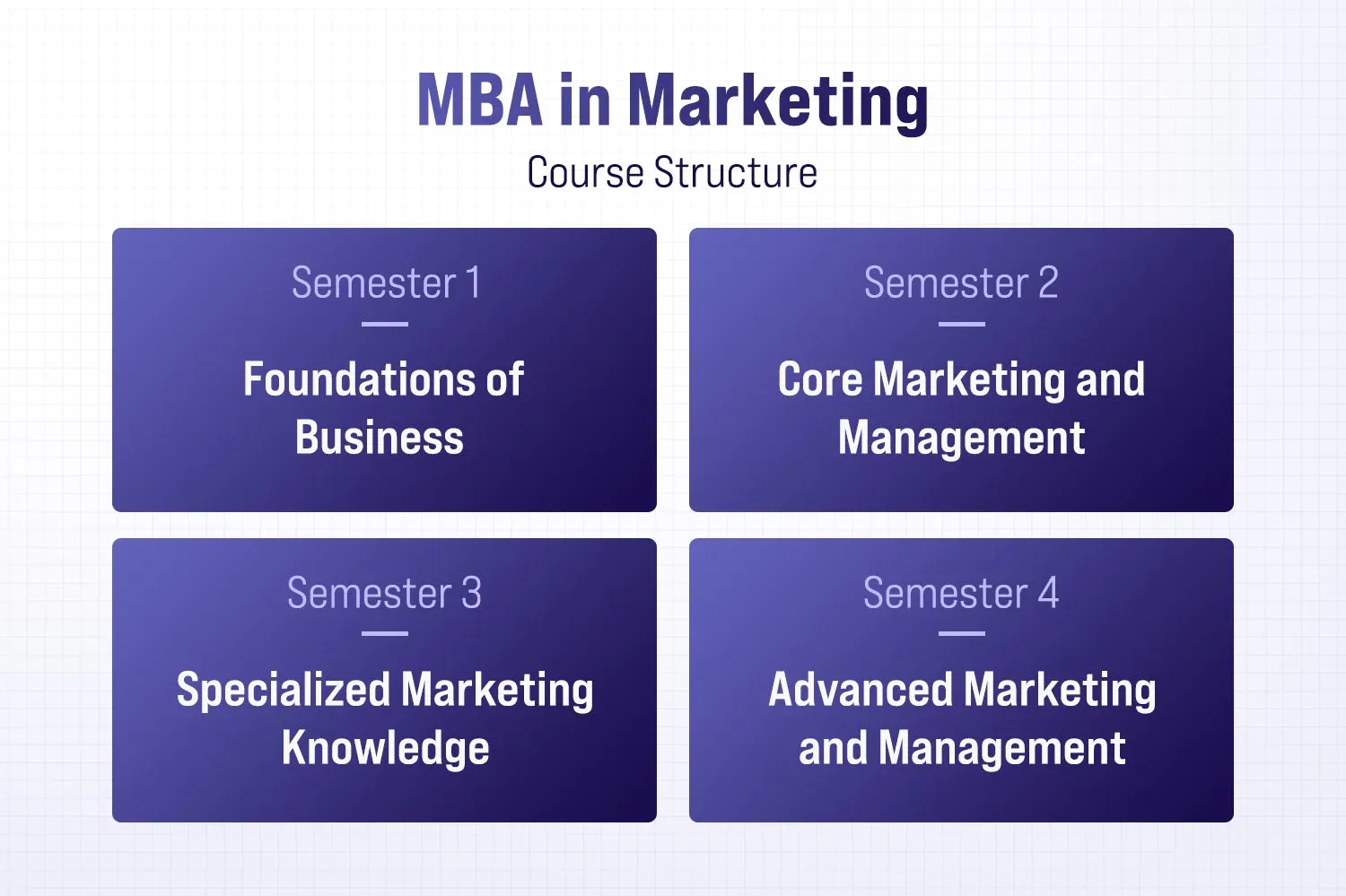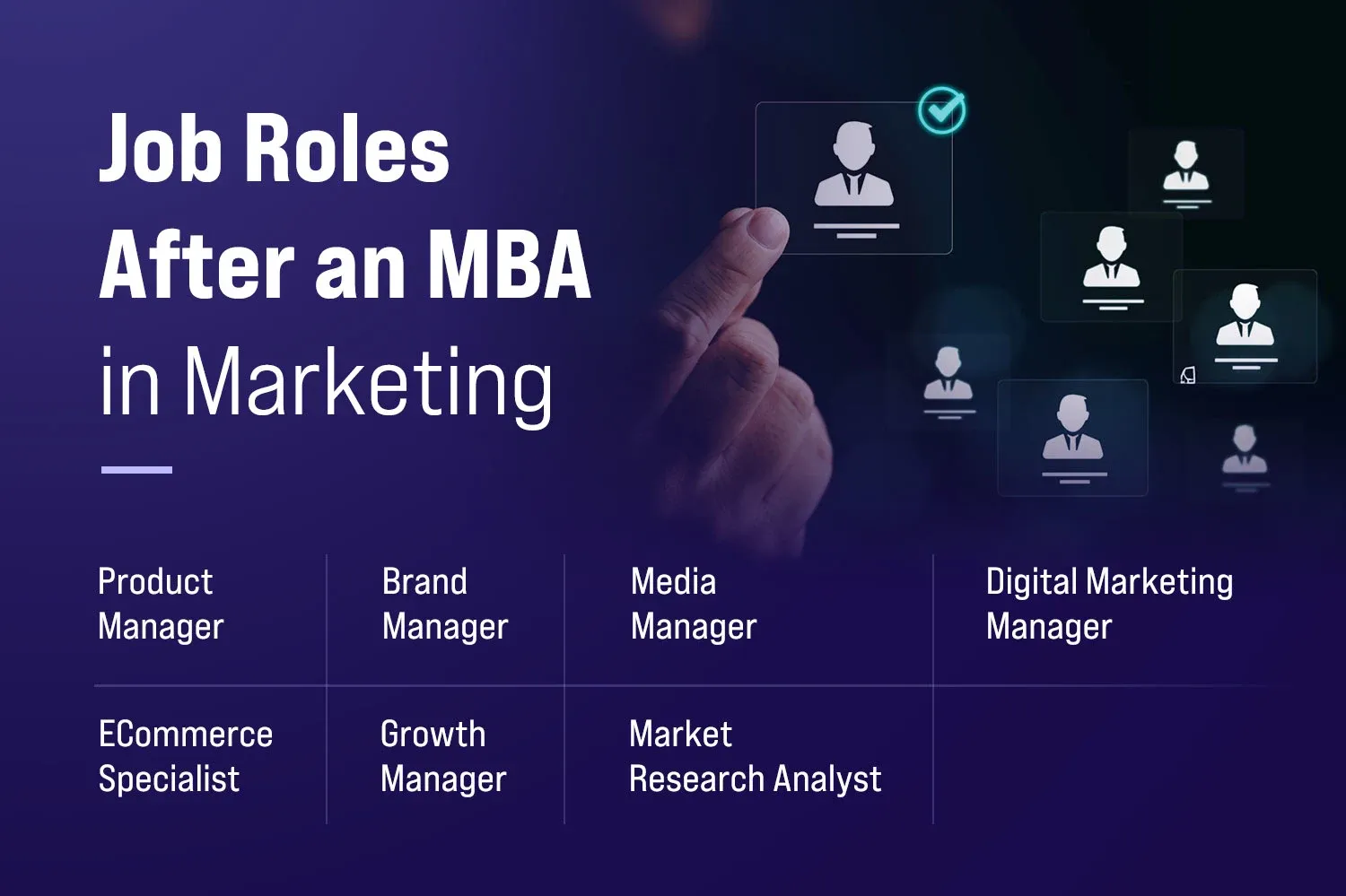Best College for Marketing in India

Among the most coveted professions in today’s corporate world are roles within the marketing domain. It is because the digital transformation in this field has been so significant that a new wave of exciting and high-growth opportunities has emerged and is rising in demand.
You can see this in action at top B-schools, where marketing roles attract 60% of graduating students, making it one of the most popular and employable specializations. While students understand marketing conceptually, often through its popularity as an MBA specialization, this understanding is frequently superficial.
They rarely take into account the larger picture, which is the field's constant evolution. Without this, it is unlikely that students will be able to make an informed decision that would potentially enhance their job prospects. Additionally, not every college offers the same level of opportunity, career growth, or learning experience.
In this blog, we answer a pressing question of MBA aspirants, particularly in the field of marketing: Which are the top MBA colleges in India for marketing, and what sets them apart?
There’s no doubt that top B‑schools like the IIMs offer prestige and strong placement networks. But if you're looking for a program that’s built around real industry exposure and current marketing trends, Altera’s Post Graduate Program (PGP) in Applied Marketing stands out.
What Does an MBA in Marketing Entail?
An MBA in marketing is a specialized postgraduate degree that prepares students for leadership roles in the marketing sector. This two-year course equips students with a robust understanding of consumer behavior, market dynamics, and strategic marketing concepts, blending theoretical knowledge with practical skills needed to succeed in the competitive marketing landscape.
The program is designed to foster analytical thinking, leadership abilities, and managerial skills, making graduates well-suited for top management roles in various industries, from FMCG and retail to digital marketing and eCommerce.
Key Components of an MBA in Marketing
An MBA in Marketing provides students with an in-depth knowledge of essential marketing functions and practices. The curriculum is designed to cover the following core areas:
- Consumer Behavior: Understanding consumer behavior is central to effective marketing. This module examines the psychological, societal, and individual elements that shape buying behavior. It equips students with the ability to anticipate consumer needs, which is crucial for crafting targeted marketing campaigns and strategies.
- Marketing Research: MBA marketing students are trained to collect, evaluate, and derive insights from data to guide strategic choices, covering market dynamics, consumer habits, and audience segmentation for precise targeting.
- Product and Brand Management: The curriculum delves into techniques for establishing, sustaining, and elevating brand value. Students learn to manage the product lifecycle, develop competitive strategies, and increase the market share of their brand through innovation, differentiation, and effective positioning.
- Sales and Distribution Management: This subject focuses on how companies can efficiently manage their sales processes and distribution channels to ensure products reach the target market. Topics include sales forecasting, supply chain management, and creating seamless distribution strategies.
- Digital Marketing: As the digital landscape continues to evolve, MBA marketing students are trained in various digital marketing strategies such as social media marketing, content marketing, email campaigns, search engine optimization (SEO), and online advertising. Understanding these tools is critical for staying competitive in the digital age.
- Advertising and Promotion Management: Effective advertising and promotions are vital for building awareness and generating demand. This subject covers the creation, management, and evaluation of advertising strategies and promotional campaigns that communicate a product’s value to potential customers.
- International Marketing: As businesses increasingly operate in a globalized economy, understanding international marketing strategies becomes essential. This course helps students learn how to design marketing strategies that account for cultural, legal, and economic differences across countries.
- Services Marketing: Services marketing differs significantly from product marketing due to the intangible nature of services. This module teaches students how to market services such as consulting, hospitality, and banking, focusing on managing customer relationships and expectations.
- Strategic Marketing Management: This course equips students with the tools and frameworks needed to develop comprehensive marketing strategies aligned with business goals. Students learn to assess market opportunities, competition, and consumer behavior to formulate effective marketing plans.
MBA in Marketing: Course Structure
An MBA in Marketing is generally a full-time, two-year course structured across four semesters. While specific subjects can vary slightly depending on the institution, the core curriculum typically follows a similar structure:

Semester 1: Foundations of Business
In the first semester, students are introduced to core business concepts that form the foundation for their marketing expertise. Key subjects this semester include:
- Management Concepts
- Business Environment
- Managerial Economics
- Financial and Cost Accounting
- Marketing Management
- Statistical Analysis and Operations Research
- Financial Management
Semester 2: Core Marketing and Management
The second semester builds on foundational knowledge with an emphasis on marketing and management. Some of the common subjects covered include:
- Marketing Management
- Consumer Behavior
- Advertising Management
- Production and Operations Management
- Cost and Management Accounting
- Human Resource Management
Semester 3: Specialized Marketing Knowledge
In the third semester, the curriculum becomes more specialized, with students diving into more advanced marketing concepts and strategies. Courses often include:
- Strategic Management
- Entrepreneurship Development
- International Business
- Industrial Marketing
- Retail Management
- Service Marketing and CRM
- ECommerce
Semester 4: Advanced Marketing and Management
The final semester focuses on advanced management and marketing topics, preparing students to take on leadership roles. Courses include:
- Product and Brand Management
- Sales and Distribution Management
- Integrated Marketing Communication
- Logistics and Supply Chain Management
- Total Quality Management
- Management Control Systems
Skills Developed in an MBA in Marketing
An MBA in marketing does more than just teach theoretical concepts. It also helps students develop practical skills that are crucial for success in the marketing industry:
- Leadership and Managerial Skills: Students learn how to lead teams, manage resources, and make strategic decisions that impact business growth.
- Analytical Thinking: The program cultivates students' capacity to assess market shifts, consumer patterns, and financial metrics for evidence-based decision-making.
- Strategic Thinking: Students are trained to think long-term, aligning marketing strategies with the overall goals of the organization.
- Communication Skills: Effective communication is critical for marketers, and the program emphasizes both written and verbal communication skills, particularly in presenting ideas, negotiating with clients, and pitching products.
- Digital Proficiency: As digital platforms dominate the business landscape, mastering skills like SEO, paid search advertising, social media campaigns, content strategy, and data-driven analytics has become indispensable for marketers.
Discussing the Top MBA Marketing Colleges in India
Here are the top MBA marketing colleges in India, known for their academic rigor, strong industry interface, and exceptional placement opportunities in top marketing firms.
Colleges | Program Fee (INR) |
Indian Institute of Management, Ahmedabad | 34.15 L |
Indian Institute of Management, Bangalore | 26 L |
Indian Institute of Management, Calcutta | 31 L |
Indian Institute of Management, Lucknow | 20.75 L |
Indian Institute of Management, Kozhikode | 23.50 L |
Indian Institute of Management, Mumbai | 21 L |
These institutes consistently attract recruiters from leading FMCG, tech, media, and eCommerce companies, offering graduates a wide spectrum of marketing roles ranging from brand and product management to digital strategy and growth leadership.
Top Non-IIM MBA Marketing Colleges in India?
Here's an overview of the Top Non-IIM MBA Marketing Colleges in India, which have earned a stellar reputation for their marketing programs, robust industry linkages, and consistent placement records in top-tier companies like HUL, P&G, Amazon, Mondelez, and more.
Colleges | Program Fee (INR) |
Faculty of Management Studies (FMS), Delhi | 2.32 L |
SP Jain Institute of Management and Research (SPJIMR), Delhi | 22.50 L |
Xavier School of Management, Jamshedpur | 28.6 L |
Indian Institute of Technology, Bombay | 14.61 L |
Symbiosis Institute of Business Management (SIBM), Pune | 24.2 L |
Department of Management Studies, IIT Delhi | 12 L |
Management Development Institute (MDI), Gurgaon | 24.99 L |
International Management Institute (IMI), Delhi | 22 L |
Great Lakes Institute of Management, Chennai | 14.7 L |
Altera Institute, Gurgaon | 13.44 L |
Recognizing that students graduating in 2025 should develop skills for new-age roles, B-schools like the Altera Institute are able to carve out a space for themselves in this niche.
It offers a Post Graduate Program (PGP) in Applied Marketing that connects academic theory with real-world industry demands.
Differing from conventional MBAs, this 15-month program is crafted by experts from leading firms like HUL, Mamaearth, and Reckitt to prepare graduates for high-growth, digitally driven roles.
What sets the program apart is its unique USPs:
- The Altera curriculum is crafted by top industry leaders from renowned companies like HUL, Mamaearth, Reckitt, and others.
- The program is delivered entirely by seasoned industry experts, including CXOs and business leaders from over 20 prominent organizations.
- The curriculum emphasizes practical application, allowing students to engage in case competitions, business simulations, and live projects with top D2C brands like TheWholeTruth Foods, Bombay Shaving Co., Pilgrim, and more.
This strategic design ensures graduates are precisely positioned for top roles at premier organizations such as Godrej, Himalaya, Flipkart, Amazon, Blinkit, and Mamaearth.
If you are a professional seeking a specialized curriculum for digital first careers, the Altera Institute can be the right choice for you.
Job Roles After an MBA in Marketing
In the professional world, every role within an organization typically falls into one of two broad categories: cost-centric or revenue-centric. Understanding these classifications is crucial for students and professionals aiming to make strategic career choices, especially in high-growth areas like marketing.
- Cost-Centric Roles: These roles are vital for businesses to function smoothly, but they have little to no direct impact on revenue generation. As a result, positions such as accounts manager, human resource manager, and internal operations manager are cost-centric in nature. They are necessary components but have little to no contribution in direct revenue generation.
- Revenue-Centric Roles: These roles are actively responsible for boosting a company's total revenue or gross sales, which drives the company's top line. Roles like brand managers, sales representatives, and product managers are considered revenue-centric because they are often the ones that are directly responsible for this growth.
Have you noticed how marketing professions like brand and product managers are categorized as revenue-centric? It is because they are customer-facing functions that have the greatest direct impact on a company’s revenue goals. This is also the reason why most CEOs are from marketing and sales backgrounds.
Now add digital transformation to the mix, and the scope of marketing expands exponentially. Today’s consumers live, interact, and shop online, which has created demand across companies and sectors for digital-first roles like product management, eCommerce, growth, digital brand management, etc.
This shift has elevated marketing from a traditional support function to a digital-first, revenue-focused role, which in turn provides marketing students with high-demand, high-reward career paths. Here are the job opportunities that students can target after an MBA in marketing:

Brand Manager
A brand manager acts as the end-to-end custodian of a brand. They are essentially the CEO of the brand, responsible for ensuring its growth, relevance, and profitability in the market.
Key Responsibilities:
- Brand Identity Management: This includes everything from the logo, tone of voice, and packaging to the product’s positioning and visual representation.
- Cross-functional Leadership: They collaborate with internal teams like R&D, sales, finance, and supply chain, as well as external partners like advertising and media agencies.
- Strategic Planning: Brand managers design and implement long-term brand strategies to strengthen market presence and drive profitability.
- Decision-Making: As the final authority on brand matters, they approve advertising campaigns, promotions, packaging innovations, and pricing models.
Media Manager
A media manager is responsible for making multi-crore investment decisions that determine how and where a brand communicates with its consumers.
Key Responsibilities:
- Media Strategy: Develop media plans that balance traditional platforms (TV, print, radio) with digital channels (YouTube, Google Ads, Instagram, etc.).
- Budget Allocation: Allocate marketing spend effectively to maximize ROI and reach the target audience across touchpoints.
- Performance Analysis: Measure and evaluate the performance of various media campaigns using tools and analytics platforms.
- Channel Optimization: Continuously refine media strategies based on data to improve brand reach, recall, and engagement.
Digital Marketing Manager
Digital marketing managers perform broad functions like enhancing the online visibility of a company, managing content across digital platforms, engaging with audiences in social media channels, and collaborating cross-functionally in a company to best market their offerings on digital platforms.
Key Responsibilities:
- SEO & SEM Management: Drive traffic through organic and paid search.
- Social Media Strategy: Create engaging content for platforms like LinkedIn, Instagram, Twitter, and Facebook.
- Email Campaigns: Build automated email flows for lead nurturing and conversion.
- Analytics & ROI: Leverage tools like Google Analytics, HubSpot, and Meta Ads Manager to evaluate campaign effectiveness.
- Content Strategy: Partner with content creators to ensure messaging aligns with brand vision and search trends.
Market Research Analyst
A market research analyst interprets data to provide actionable insights that help companies understand market needs and design customer-centric strategies.
Key Responsibilities:
- Data Collection: Conduct surveys, focus groups, and analyze consumer trends.
- Competitive Analysis: Benchmark company performance and offers against competitors.
- Trend Forecasting: Identify upcoming market shifts and evolving customer needs.
- Data Reporting: Create data-driven presentations that influence product launches and marketing campaigns.
ECommerce Specialist
An eCommerce Specialist is the architect behind a brand’s online retail success. They oversee everything from product listings to marketing campaigns on platforms such as Amazon, Flipkart, Myntra, or the brand’s own website.
Key Responsibilities:
- Platform Oversight: Optimize eCommerce website functionality, design, and UX to ensure smooth browsing and transactions.
- Site Performance: Use tools like Google Analytics, Shopify dashboards, or Amazon Seller Central to track metrics and address technical issues that affect customer experience.
- Sales Funnel Management: Guide customers through the journey from website visit to final purchase, minimizing bounce rates and abandoned carts.
- Promotional Planning: Devise attractive online offers and deals during key seasons to increase engagement and revenue.
Product Manager
While often associated with the tech world, product managers are vital in both traditional and digital industries. They manage a product’s entire journey, from conception to post-launch strategies.
Key Responsibilities:
- Product Strategy & Vision: Define what the product should be, who it's for, and how it fits into the market.
- Market Research: Examine consumer preferences, competitive landscapes, and market trends to shape product development.
- Cross-functional Collaboration: Coordinate with engineering, sales, marketing, and design teams to ensure unified objectives and implementation.
- Customer Focus: Gather user feedback to improve the product and enhance the overall customer experience.
- KPIs & Performance: Monitor adoption, usage rates, and satisfaction to drive continuous improvement.
Growth Manager
A growth manager identifies and capitalizes on opportunities to drive business expansion. Their approach is deeply rooted in data, experimentation, and strategic thinking. Rather than focusing solely on one marketing channel or stage of the user journey, growth managers take a full-funnel ownership approach to fuel exponential growth.
Key Responsibilities:
- Strategic Planning: Establish clear growth goals aligned with company objectives—these could include increasing customer base, improving user retention, reducing churn, or growing revenue per user.
- Market and User Analytics: Analyze customer behavior, product usage data, and market trends to uncover actionable insights.
- Multi-Channel Marketing: Plan and run campaigns across channels including social media, performance marketing, email, influencer outreach, SEO, and partnerships.
- Framework Testing: Implement A/B tests and multivariate experiments to understand which variables influence user behavior most.
- Strategy Adjustments: Refine tactics based on real-time analytics and user feedback to keep growth initiatives agile and responsive.
Top MBA Marketing Companies in India
By now, it is clear that MBA graduates specializing in marketing are among the most sought-after professionals across industries. Leading marketing-driven companies value the strategic mindset, analytical skills, and cross-functional expertise that MBA students bring, especially those from top-tier B-schools.
These organizations are brand powerhouses with deep-rooted market presence, diversified portfolios, and exceptional growth trajectories. Here are the top companies in India that hire MBA marketing graduates:
Hindustan Unilever Limited (HUL)
HUL is the gold standard when it comes to marketing excellence. With an expansive portfolio of household brands like Dove, Surf Excel, Lakmé, and Lipton, the company offers marketing graduates the chance to lead full-scale brand operations early in their careers.
HUL is known for its Management Trainee (MT) program, which grooms future CMOs through challenging rotations across sales, brand management, and digital marketing functions.
Procter & Gamble (P&G)
Globally revered for its consumer-centric approach, P&G is home to legacy brands like Gillette, Ariel, Tide, and Head & Shoulders. Its unique ‘Brand Manager as CEO’ philosophy gives young marketers end-to-end ownership of products, from P&L to packaging to communications. It’s also renowned for structured mentorship and world-class leadership development.
ITC Limited
ITC’s marketing strength lies in its diverse portfolio—from FMCG brands like Aashirvaad and Bingo to luxury products under Fiama and Engage. MBA marketers get exposure to new product development, rural marketing, and omni-channel strategy. ITC is known for empowering young managers with high-stakes roles early in their careers.
Nestlé India
Nestlé’s iconic brands like Maggi, KitKat, Nescafé, and Cerelac make it a brand management haven for MBA graduates. The company places emphasis on consumer behavior, retail strategy, and innovative marketing, providing a strong foundation in classic marketing as well as modern trade practices.
Jubilant FoodWorks Ltd.
Managing global franchises like Domino’s Pizza and Dunkin’, Jubilant’s marketing teams are focused on consumer segmentation, product innovation, digital ordering behavior, and experiential branding. MBA marketers here learn to thrive in fast-moving, data-rich environments.
Amazon (ECommerce and Digital Marketing)
Amazon is the go-to employer for MBA marketers keen on working at the intersection of data, innovation, and scale. The company has a wide array of roles in performance marketing, category management, consumer insights, and brand advertising. Amazon offers a highly meritocratic environment where MBA grads can move fast and scale ideas across millions of customers.
FAQs
Q1. Which IIM is best for marketing?
Ans: IIM Ahmedabad is widely regarded as the best IIM for marketing due to its case-based pedagogy, marketing-focused electives, and a strong record of top marketing companies like HUL, P&G, and Nestlé visiting for placements.
It’s closely followed by IIM Bangalore and IIM Calcutta, both of which also offer excellent marketing specializations, strong faculty, and top-tier placement opportunities.
Q2. Which academic pathway is best for marketing?
Ans: The best study path for a career in marketing is a full-time MBA in marketing, ideally from a reputed B-school in India. This course provides comprehensive expertise in key domains such as consumer psychology, brand strategy, digital marketing, analytics, and marketing strategy.
Additionally, undergraduate degrees in business administration, commerce, economics, or mass communication can also provide a strong foundation before pursuing an MBA.
Q3. Which is the top business school in India?
Ans: As per NIRF rankings and consistent performance, IIM Ahmedabad is considered the top business college in India. It leads across most parameters, including academic excellence, alumni network, global recognition, and placement performance. Its rigorous pedagogy and brand reputation make it the most sought-after choice for MBA aspirants.
Q4. Which university is best for an MBA in marketing?
Ans: When it comes to pursuing an MBA in marketing, the Indian Institutes of Management (IIMs) are widely regarded as the best due to their strong academic rigor, stellar placements, and top-notch faculty. Other highly respected options include FMS Delhi (offering exceptional ROI), XLRI Jamshedpur, SPJIMR Mumbai, and NMIMS Mumbai, all known for their specialized marketing programs and strong industry links.
For those seeking a practical, industry-aligned alternative, Altera's PGP in Applied Marketing stands out for its hands-on curriculum, real-world projects, and mentorship from top marketing professionals.
Summing Up
An MBA in marketing is a gateway to dynamic, high-impact careers at the intersection of strategy, creativity, and data. With a curriculum that blends foundational business knowledge with cutting-edge marketing practices, the program equips students to thrive in both traditional and digital-first environments.
Whether it's driving product innovation, building powerful brands, or unlocking growth through digital channels, marketing professionals are increasingly at the forefront of business leadership and revenue generation. As industries continue to evolve in response to digital transformation and consumer-centric strategies, the demand for skilled marketing professionals from top-tier MBA institutes is only set to grow.





